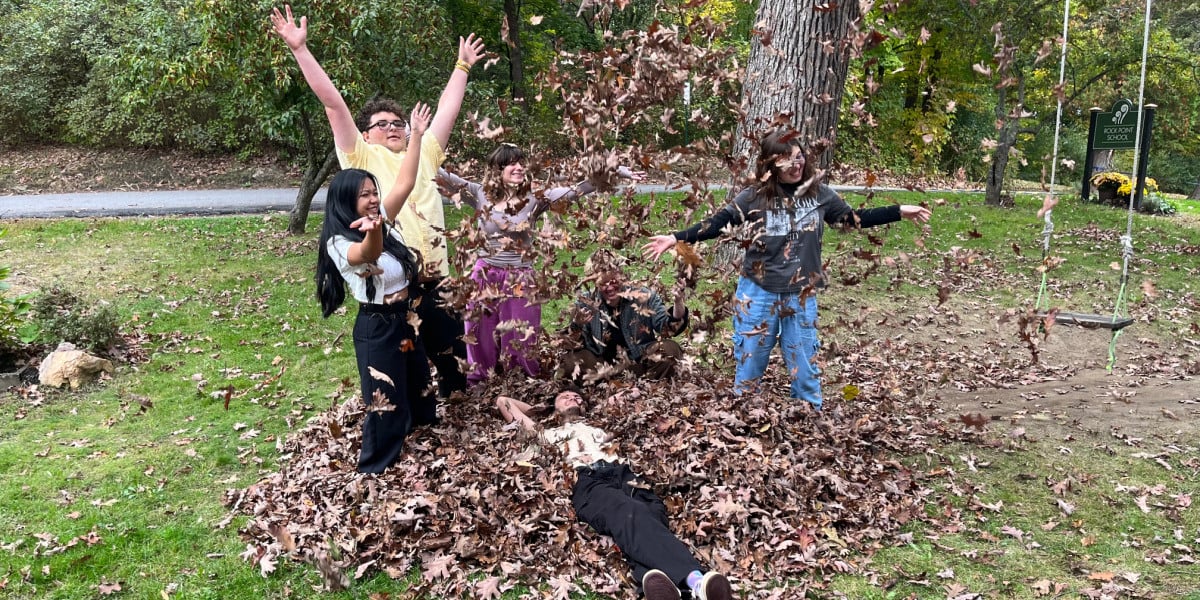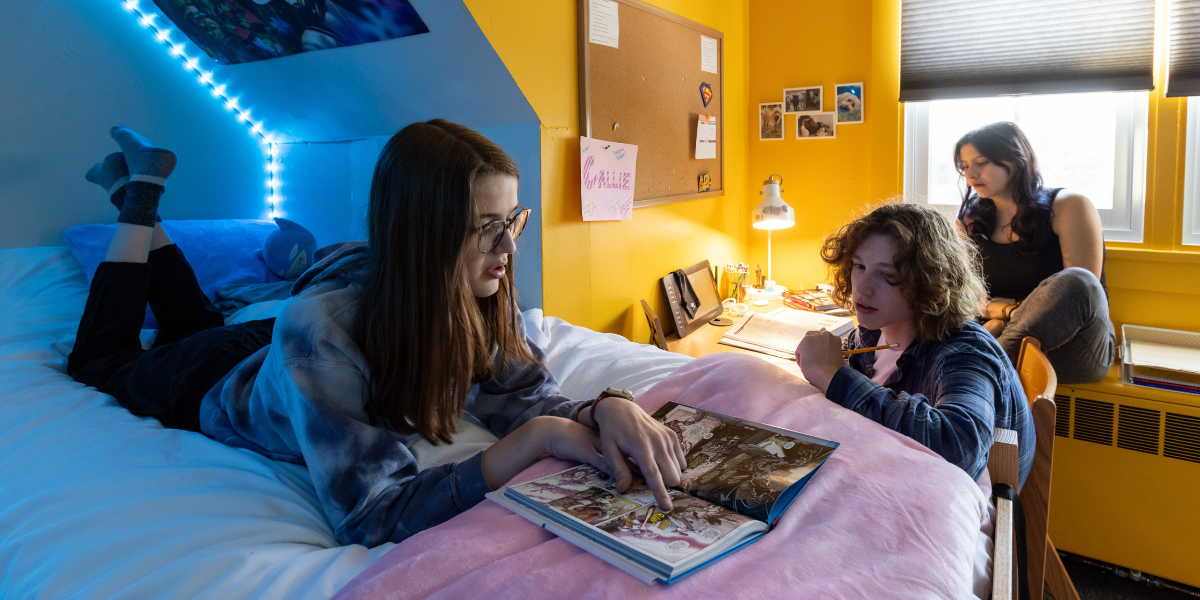Small is Beautiful: Education as if Every Student Really Mattered
In the small, beautiful, lakeside community of Burlington, there are both the advantages of a city — public transportation, rich cultural...
5 min read
CJ Spirito : December 26, 2024

I had a plan going into our weekly school-wide Reflections meeting before vacation, but as often happens when working with teens, my plan changed. Reflections is a weekly tradition at Rock Point School—a time to explore big ideas like dignity, spirituality, and how we aspire to live in the world. But on this day, faces looked strained, postures were slouched, and the air felt heavy. I wondered what was going on. So, I asked. My students, as usual, surprised me with the depth and breadth of their answers.
From personal struggles to global concerns, their worries poured out. All of the pressures felt big to each student who shared what was on their mind.
"Stress" is a term we use all the time in daily conversation, but what does it really mean?
The National Institute of Mental Health defines stress as our physical and mental responses to some external event. The event could be considered “good,” like preparing to go to the prom, or bad, like feeling tense after an illness, arguing with a friend, or preparing for an upcoming test.
The good thing about most stress is that it usually goes away once the external event causing the stress is over.
In contrast, anxiety is internal. It's your ongoing reaction to stress even when there is no current threat, and that reaction interferes with how you live your life.
So, the question remains: why do teens experience stress and anxiety, and what can we do about it? Life as a teenager has never been easy, but today’s world adds unique challenges. The constant pull of social media, relentless academic demands, and exposure to global issues create a whirlwind of stressors that can feel overwhelming. Here are seven common sources of stress for teens and strategies to help them regain balance.
From comparing themselves to peers to absorbing unfiltered news, social media is a double-edged sword. It connects teens but also adds pressure and heightens insecurities. At Rock Point School, we emphasize these steps to support healthier habits:
• Model healthy behavior: If you ask your teen to limit their screen time, make sure you’re doing the same.
• Set tech boundaries: Keep devices out of bedrooms to encourage better sleep and create a much-needed break from the digital world.
• Teach online safety: Work together to set privacy settings and discuss how to spot misinformation.
While taking a completely negative tone around technology use is not useful, it is important to help teens realize the consequences of overuse and help create a healthy balance. Check out our Ten Teen Tech Tips for more tips on limiting screen time.
Many teens feel weighed down by expectations to excel in school. Balancing workloads, managing deadlines, and meeting vague "high standards" can feel relentless. But academic rigor has evolved. Rather than the idea of academic excellence being standardized and uniform, education experts are starting to agree that excellence can look different for each student. We have used this philosophy for decades at Rock Point School and have seen the best results from students when they’re challenged at an appropriate level for their individual needs. Help them break down new learning tasks into manageable steps and prioritize rest—it’s just as important.
It is surprising for some people to hear how many teens are tuned into current events, but social media has made the news more accessible and constant for everyone. Teens feel the same anxiety many adults feel when they hear about wars, global warming, discrimination, school shootings, or economic downturns. The first thing we as adults can do is not dismiss teens' anxiety about these larger issues. Their feelings are real, and these are legitimate reasons for concern, yet we have to help teens learn how to function in the world in which we live.
Managing this kind of anxiety is difficult for anyone because these problems are much bigger than what one individual can handle. Taking action is a remedy that can help your teen (and maybe yourself) feel better:Dealing with peer pressure, navigating friendship struggles, and adjusting to changing social groups are often intense and emotionally charged experiences for teens, affecting their sense of self and overall well-being. Peer pressure and friendships can be negative and positive for this age group. Positive peer pressure can help teens develop coping skills and prepare for adulthood. It can encourage teens to become more active in learning or how to avoid risky behaviors, which can be especially helpful during stressful times. On the other hand, it's widely recognized that negative peer pressure can lead teens to feel like they don't fit in, become very image-conscious, try alcohol or drugs, quit school, or engage in other poor behaviors that could put their health at risk.
Adults can play an important role for teens by modeling what a safe, supportive community of peers looks like, encouraging open conversations, and reminding them that it’s okay to set boundaries with friends who don’t bring out their best selves.
Tension at home or school—whether due to power struggles, disagreements, or differing views—can take a toll on teens. Setting clear boundaries and creating space for honest, judgment-free discussions can help build trust and ease the strain.
Questions about college, career paths, life goals, and family well-being can feel daunting. Significant family life changes like a divorce, new sibling, or relocation can cause stress within the family. Help your teen identify a trusted adult or counselor they can talk with, explore their interests, and take small steps toward clarity, like shadowing a professional in a career field they’re curious about.

If your teen seems overwhelmed and is struggling to enjoy daily life — having trouble sleeping, eating, attending school, or enjoying life — it’s important to seek additional support. A professional counselor or therapist can provide tools tailored to their needs, complementing the strategies you practice at home.
In an often overwhelming world, understanding what stresses teens out and taking steps to help them act positively on these challenges can help them build resilience and find balance.
I’m so stressed out! Fact sheet. National Institute of Mental Health. https://www.nimh.nih.gov/health/publications/so-stressed-out-fact-sheet#pub3
11 healthy ways to handle life’s stressors, APA
https://www.apa.org/topics/stress/tips
How Peer Pressure Influences Your Child, Parent
https://www.parents.com/how-peer-pressure-affects-children-8619289
Caring for Your Mental Health, NIMH
https://www.nimh.nih.gov/health/topics/caring-for-your-mental-health

In the small, beautiful, lakeside community of Burlington, there are both the advantages of a city — public transportation, rich cultural...

Adolescence is a time of enormous growth and self-discovery. As teens navigate who they are, how they fit in, and what matters to them, they need...

“But what do you do in the winter?” is a question that I hear frequently from people outside Vermont when they learn about our small boarding and day...